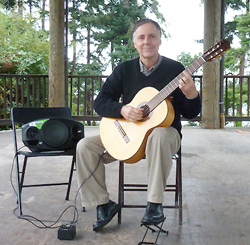
For more than 30 years, Julian Catford’s music has been a mainstay at dozens of venues in the Seattle area; performing solo as well as sharing the stage with such greats as Cab Calloway, Rosemary Clooney, The Mills Brothers, Ed Ames and Little Anthony.
Catford, who has performed internationally, also teaches guitar at Seattle Pacific University and performs at weddings and other event using his Mackie FreePlay to provide him with a portable personal PA.
“It’s really the perfect system for weddings, garden parties, and a lot of the more intimate gigs I play every week,” Catford remarks.
“It’s portable like crazy – the rechargeable battery enables me to be completely self-sufficient, and position myself in the best location, rather than having to be near an electrical outlet. And even at a show lasting several hours, I’ve yet to run down the battery.”
Sonically, FreePlay offers the tone and performance Catford needs for his instrument.
“For classical and flamenco in particular, it’s important to have a system that delivers the subtlety and overtones of the guitar,” he observes. “FreePlay sounds great, and gives me a nice, full-spectrum sound – great bass and articulate high end. The built-in reverb and EQ are more than enough to shape the sound I need, regardless of the space I’m performing in. And I love the FreePlay Connect app, which enables me to not only control my mix from my iPhone, but to stream music to it from my phone during breaks.”
Even for larger gigs, Catford finds FreePlay useful. “I’ve used it with one of the acoustic trios I gig with, and it makes a great personal monitor. It’s got enough output to easily cut through, even when I’m playing with a louder instrument like an accordion.”
Catford says his Freeplay is not his first portable system, but it’s certainly the best he’s used.
“I had another small amp I used for quite some time, but I could never really depend on it – sometimes it was just too loud for the space, sometimes it was just too boomy, sometimes it wouldn’t work at all. And it didn’t have nearly the features that Freeplay does. With FreePlay, I can take it to a gig with confidence that it will sound good and do what I need it to do.”
